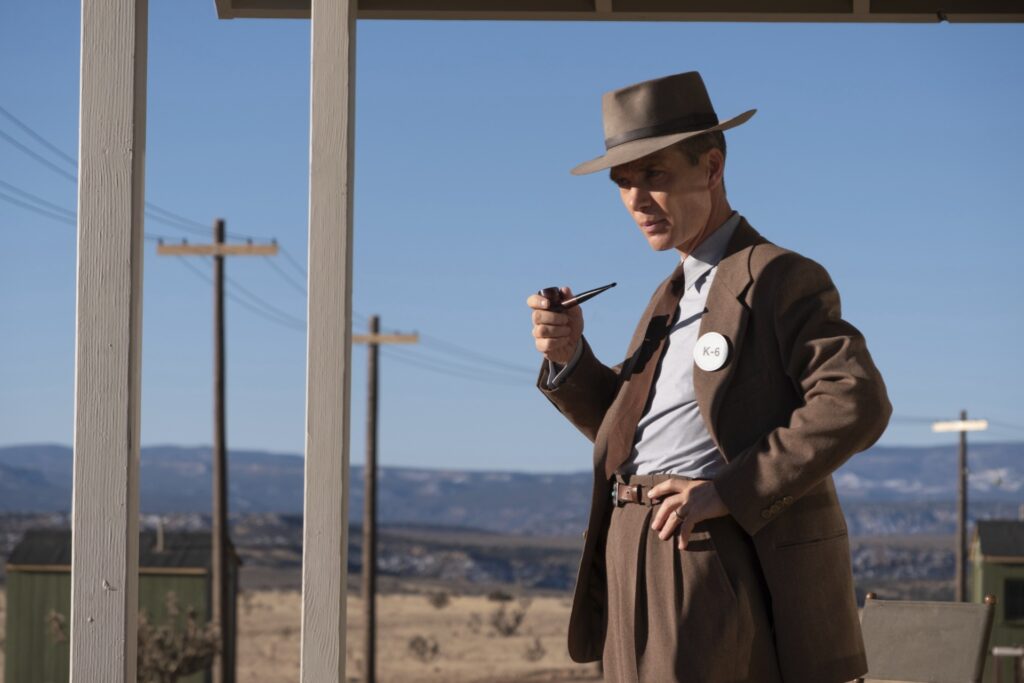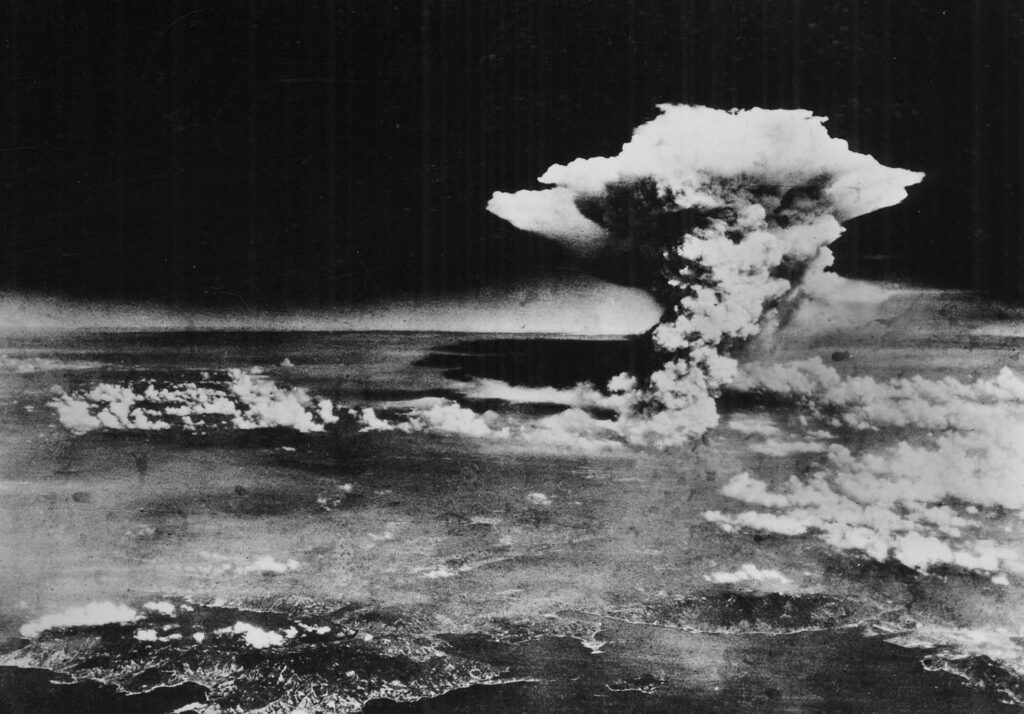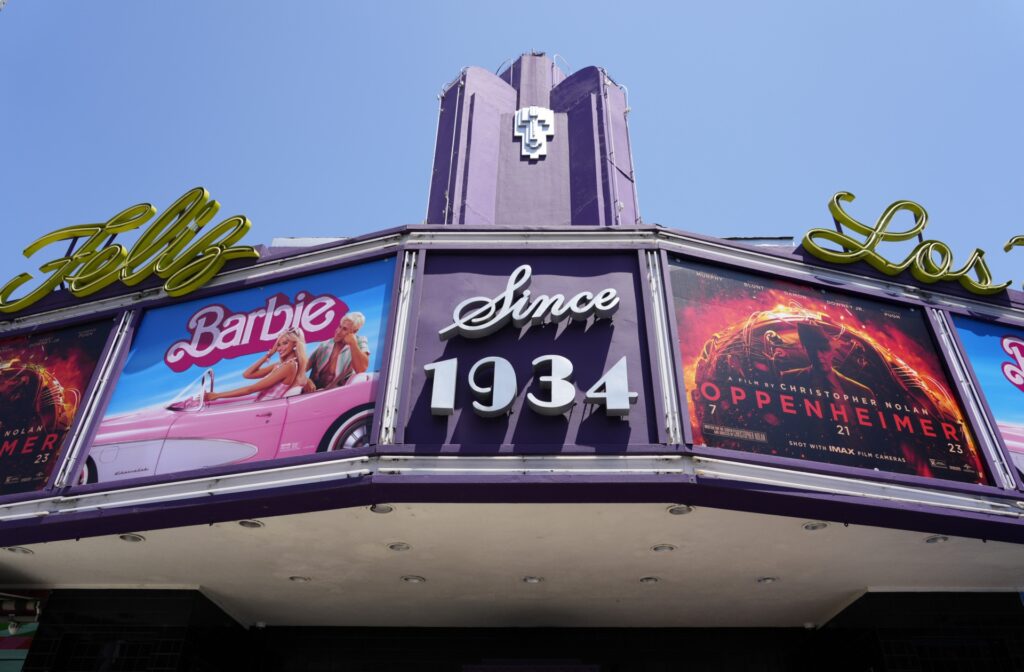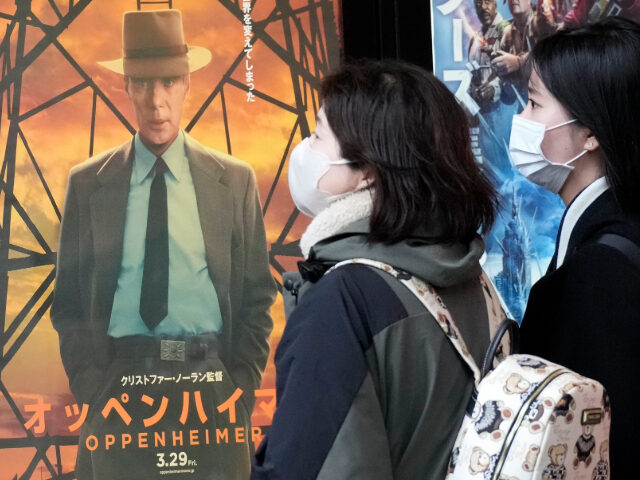Oppenheimer, the Oscar-winning drama about the key scientist in the creation of the atomic bomb, finally began screening in Japan on Friday.
Some theaters reportedly posted signs warning that watching the film could be traumatic for Japanese audiences since it references the bombings of Hiroshima and Nagasaki.
Oppenheimer, directed by Christopher Nolan and starring Cillian Murphy in the title role, was the most lauded film of the year at the Academy Awards on March 10. It was also a box-office juggernaut, which is especially remarkable for a dialogue-heavy three-hour movie in which no one leaps over a skyscraper.

Cillian Murphy in a scene from “Oppenheimer.” (Universal Pictures via AP)
The juggernaut has finally rolled into Japan, which is normally a big market for Hollywood productions, but the country was reluctant to premiere a movie that might irritate the national trauma of the atomic bombings.
Oppenheimer does not actually show the bombings, but it alludes to them with some disturbing imagery meant to demonstrate how conflicted the title character is about his role in creating the ultimate weapon. It is difficult to imagine how a film about the Manhattan Project could approach the topic of Hiroshima with more sensitivity.
Evidently, some theaters in Tokyo decided even more sensitivity was warranted because they posted signs outside cinema doors warning that while the movie does not depict the bombings of Hiroshima and Nagasaki, it does show the Trinity A-bomb test in great detail, and that might be more upsetting to Japanese audiences than most others.
Some Japanese viewers were more upset that Nolan did not show the bombings of Hiroshima and Nagasaki in graphic detail.
“There could have been much more description and depiction of the horror of atomic weapons. From Hiroshima’s standpoint, there wasn’t enough about the horror of nuclear weapons, but I would encourage people to go and see it,” said Kiraoka Takashi, 96, the former mayor of Hiroshima.
“I was waiting for the Hiroshima bombing scene to appear, but it never did. It’s important to show the full story, including the victims, if we are going to have a future without nuclear weapons,” said Mimaki Toshiyuki, an 82-year-old survivor of the bombings.

A mushroom cloud billows about one hour after a nuclear bomb was detonated above Hiroshima, Japan, on August 6, 1945. (AP Photo/U.S. Army via Hiroshima Peace Memorial Museum)
Another reason for the delayed opening in Japan was the marketing campaign for Oppenheimer, which included humorous pairings with a very different blockbuster film released around the same time, Barbie. The American public seemed to find it endlessly amusing that two such different films would come out together, and the studio leaned into those goofy memes to market both productions.
The Japanese were not amused. Warner Brothers Japan apologized to the Japanese public in August for its “insensitive social media engagement”:
We consider it extremely regrettable that the official account of the American headquarters for the movie “Barbie” reacted to the social media postings of “Barbenheimer” fans. We take this situation very seriously. We are asking the U.S. headquarters to take appropriate action. We apologize to those who were offended by this series of inconsiderate reactions.
The most annoying example of this marketing was apparently a fan art poster for the two films, which depicted Barbie riding on Oppenheimer’s shoulders with a mushroom cloud in the background. The U.S. Twitter account for Warner Brothers retweeted the image with the comment, “It’s going to be a summer to remember.” Japanese social media users were outraged by the levity, accusing the studio of trivializing the atomic bombings.

The marquee of the Los Feliz Theatre features the films “Barbie” and “Oppenheimer” on July 28, 2023, in Los Angeles. (AP Photo/Chris Pizzello, File)
Now that Oppenheimer is finally on screens in Japan, audiences generally seem to like the film, and even some Japanese viewers who still question how it handled the bombings were quick to praise Nolan’s craftsmanship and Murphy’s acting. This included viewers in Hiroshima — such as former Mayor Kiraoka — who are old enough to remember August 6, 1945, or were born in the aftermath of that terrible day.
“The film was very worth watching, but I felt very uncomfortable with a few scenes, such as the trial of Oppenheimer in the United States at the end,” said 65-year-old Kanegae Agemi of Hiroshima.
“I had thought the film’s lack of images of atomic bomb survivors was a weakness. But in fact, Oppenheimer’s lines in dozens of scenes showed his shock at the reality of the atomic bombing. That was enough for me,” said Professor Masao Tomonaga, a survivor of the bombings and honorary director of the Japanese Red Cross Nagasaki Atomic Bomb Hospital.

A scene from “Oppenheimer” (Universal Pictures)
One of the most interesting reactions came from Yamazaki Takashi, a filmmaker who won an Oscar on the same night as Nolan for Godzilla Minus One.
Yamazaki told Nolan online that he was interested in making “an answer from Japan to Oppenheimer.”
The easy jest would be that he already did since Godzilla grows to titanic size because of American A-bomb tests, but Godzilla Minus One minimizes that aspect of the monster’s lore — it is very much about Japan’s war guilt and its people trying to rebuild their shattered lives in the aftermath of the conflict. Nolan said he was very much in favor of Yamazaki telling the stories of Hiroshima and Nagasaki from the Japanese perspective, without any giant lizards.
Ironically, even as Japan finally gets to see Oppenheimer, it is all but impossible for Americans to watch Godzilla Minus One — the movie did incredibly well at the American box office during its limited run, but it is no longer available in theaters and has no streaming release date in the United States, apparently due to contractual agreements between Japan’s Toho studio and the makers of the American “MonsterVerse” movies featuring Godzilla.

COMMENTS
Please let us know if you're having issues with commenting.